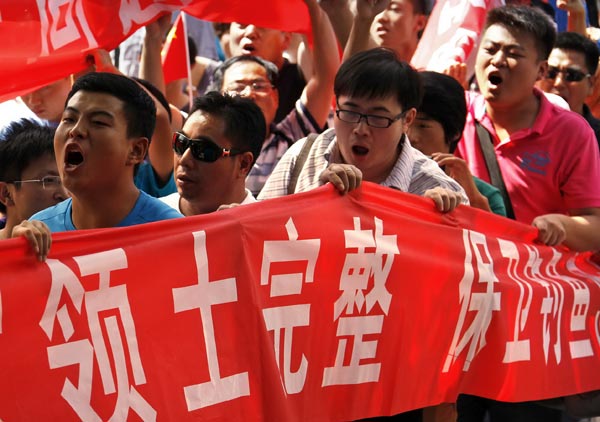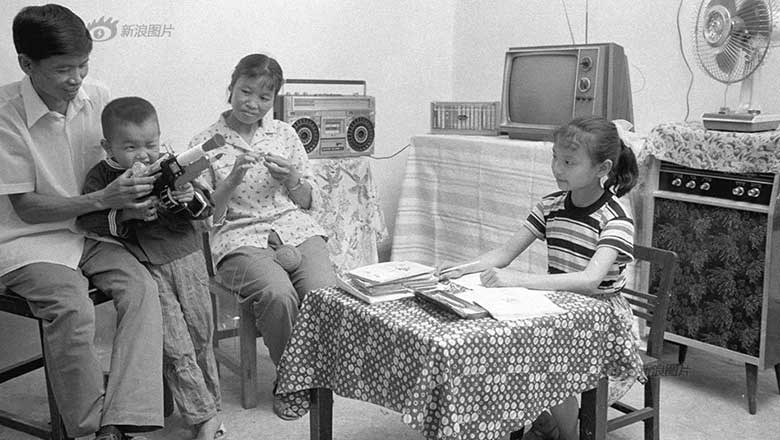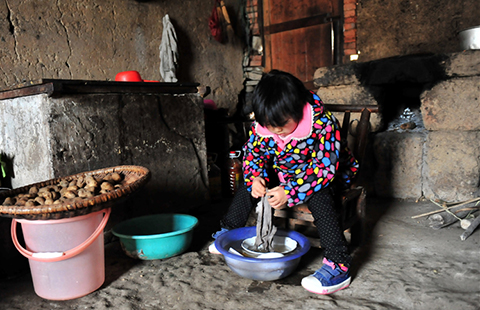

A former speaker of Japan's lower house said that the Japanese government's "nationalization" of the Diaoyu Islands has gone too far, as tensions between China and Japan continue to simmer.
 |
|
Demonstrators hold banners (territorial integrity and protection of Diaoyu Islands in Chinese) and chant slogans as they protest outside the Japanese embassy in Beijing on Wednesday. David Gray / Reuters |
Yohei Kono, 75, a veteran Japanese politician and member of the Liberal Democratic Party, told the latest monthly journal Sekai, or The World, published by Japan's Iwanami Shoten, that compared with the political show of Tokyo Governor Shintaro Ishihara's "islands-purchasing" speech, Japanese Prime Minister Yoshihiko Noda government's "nationalization of the islands" has done more to fuel the current tension.
The Noda government's moves have gone too far and caused Japan to forgo its peaceful foreign policy, Kono said.
He called for "rational" and "honest" foreign policy as a series of moves by the current Japanese government has made the issue more complicated.
Wang Ping, an expert on Japanese studies with the Chinese Academy of Social Sciences, said Kono's remarks represent "a voice of reason" within Japan.
"As a senior Japanese politician, Kono has captured the key point," Wang said.
Kono served as speaker of Japan's House of Representatives from November 2003 until August 2009, the longest time anyone has held the post since the lower house was created in 1890. As a senior politician, Kono has also worked as minister of foreign affairs for Yoshiro Mori's Cabinet in 2000 and chief Cabinet secretary for Kiichi Miyazaki in 1992.
"What has Noda's Cabinet done? The media is only staring at a consumption tax and a Cabinet reshuffling. But Noda has quietly revised laws concerning diplomacy and security, such as relaxing weapons exports and seeking the right of collective self-defense, which has damaged Japan's image as 'a peaceful nation', " Kono said.
Wang echoed Kono's criticism of the Japanese government.
"What Noda has promoted after taking office already has violated Japan's pacifist constitution. Junichiro Koizumi is the instigator, but Noda is much more reckless to carry out conservative and hard-line positions," she said.
"Since the pacifist constitution is still effective, Noda's moves are actually unconstitutional," she added.
Kono also warned that Japan's international image would be greatly tarnished if the government failed to make proper gestures or release appropriate information as expected.
The politician urged the Japanese government to improve relations with other Asian countries, adding that Tokyo should remember history and not abandon principle and a broad viewpoint.
While Kono was chief Cabinet secretary in 1993, he made headlines when he released a statement on the "comfort women" issue and expressed "sincere apologies and remorse" for their suffering.
"Comfort women" was a euphemism for girls and young women who were forced to become sex slaves for the Japanese military throughout the Far East and Southeast Asia during World War II.
The statement said: "The recruitment of comfort women was conducted mainly by private recruiters who acted in response to a request from the military. In many cases, they were recruited against their will, through coaxing, coercion, and so on, and that, at times, administrative and military personnel directly took part in the recruitments."
But the Noda administration is reluctant to recognize even such a simple statement.
Though the government admitted in the Kono statement that the Japanese military was broadly involved in the establishment of "comfort stations" and the management of comfort women, Noda suggested the statement did not present direct evidence, claiming that his government "was not able to confirm the forcible recruitment (of comfort women) from documents".
According to the conservative newspaper Yomiuri Shimbun, Noda made the remarks on Aug 27 in response to a question from a Cabinet member, Jin Matsubara, who serves as chairman of Japan's national public safety commission and has asked to review the Kono statement.
While Japanese right-wing politicians are trying to deny historical facts, more than 40 veteran military officers and scholars from the Chinese mainland and Taiwan pooled their wisdom at a symposium on safeguarding the territorial sovereignty and oceanic rights and interests of the Chinese nation.
According to the Xinhua News Agency, the symposium, which took place on Tuesday in Bo'ao in South China's Hainan province, released a declaration emphasizing China has indisputable sovereignty over islands in the South China Sea, the Diaoyu Islands and their affiliated islets.
It said that all the islands and islets mentioned above were first discovered, named and used by the Chinese, and all of them are the shared inheritance of both the mainland and Taiwan.
Contact the writer at wangchenyan@chinadaily.com.cn













